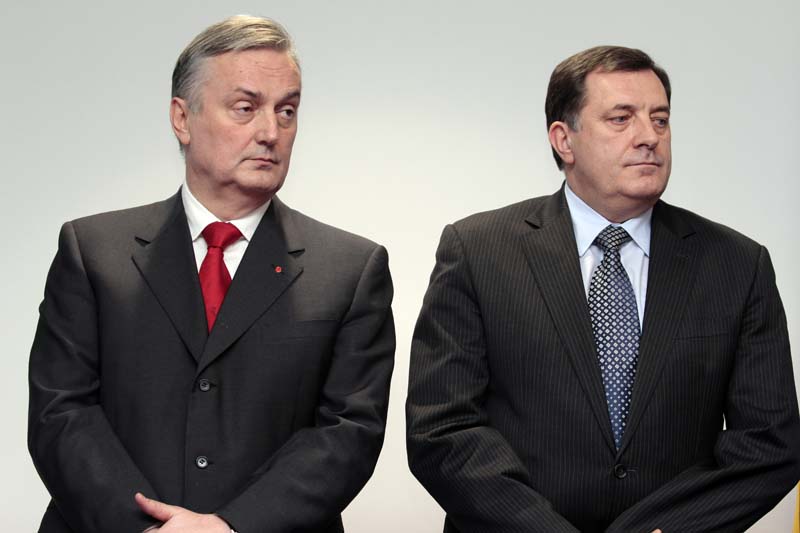Bosnia’s constitutional reform – response to Valery Perry
Florian Bieber responds to Valery Perry’s piece on constitutional reform in Bosnia and Herzegovina.
The elephant in the room – Bosnia and Herzegovina’s unmentionable Constitutional disability
Considering the experience of post-war Bosnia and Herzegovina over 18 years, it is time to seriously question whether it will ever be possible for the best executed,... Read More
Negotiating division and co-operation in today’s Bosnia
The system of government in Bosnia and Herzegovina is characterized by the tension between different types of mutually reinforcing distrust, which make institutional change and the emergence of new elites more difficult than in neighboring countries.
The silent passing of Bosnian proconsulship
By lifting the OHR's remaining bans, Valentin Inzko has quietly conceded that the OHR no longer has the moral authority to dismiss people from public office or to punish them by international decree, thereby marking a profound change in the international community's attitudes towards Bosnia and Herzegovina.
Milorad Dodik and the politics of referendum
Through threats and cajolements, Dodik is proving remarkably adept
The dangerous politics of leverage – Republika Srpska
Dodik's decision to postpone a controversial entity-wide referendum on the decisions of the international high representative will likely amount to yet another postponement of the much needed critical reexamination of the politics of the region and the political institutions of Bosnia and Herzegovina.
The Court of Bosnia-Herzegovina faces "inevitable collapse"
An interview with Matthew Parish, the former Chief Legal Adviser to the International Supervisor of Brčko, on the current political situation in Bosnia and Herzegovina, including the challenges surrounding government formation and the Republika Srpska's proposed referendum on the Court and Prosecutor’s Office.
Bosnia – not your father’s Sporazum
The current politics of “2 against 1” reflect the failure that is Bosnia and the danger that a Dayton arrangement acceptable to none of the country’s players - except maybe for Dodik - could provoke challenges even more unexpected and indelible than those so far evident.
In defense of Richard Holbrooke
Critics of Richard Holbrooke and the Dayton Peace Agreement are completely wrong - it was not Dayton that ethnically divided Bosnian politics and society, but rather that Bosnia's divided society and politics resulted in Dayton.
U odbranu Ričarda Holbruka
Kritičari Ričarda Holbruka i Dejtonskog mirovnog sporazuma u potpunosti greše – nije Dejton ono što je etnički podelilo bosansku politiku i društvo, već su bosansko podeljeno društvo i suprostavljena politika doveli do Dejtona.
Dodik’s next move – squeezing Brcko dry
With VAT the biggest single source of government revenue in Bosnia and Herzegovina, the Indirect Taxation Authority (ITA) will be the next target of Milorad Dodik's agenda to weaken state institutions.
Bosniak nationalism – the end of exceptionalism?
By ignoring the manipulation of Bosniak identity, particularly by ex-president Haris Silajdzic, the international community has contributed to the destabilization of Bosnia and Herzegovina's current institutional framework.
Strengthening the external dimensions of Dayton Bosnia
Learning from the experiences of Northern Ireland - particularly the North/South Ministerial Council - could help Bosnia and Herzegovina move beyond its current reform impasse.
Bosnia – the challenges of constitutional reform
In an exclusive interview for TransConflict, professor Bruce Hitchner, chair of the Dayton Peace Accords Project, discusses the prospects for constitutional reform in Bosnia and Herzegovina following October's elections.
The future of Dayton’s Bosnia – justice must meet peace
Bosnia and Herzegovina must amend its constitution in order to comply with the ruling of European Court of Human Rights, which aims to ensure equal treatment for all.
Bosnia must "cease being a protectorate"
An interview with Ian Bancroft, the co-founder of TransConflict, on the recent elections in Bosnia and Herzegovina, the role of the international community and the prospects for reform in the face of prevailing ethnic divisions.
Bosnia decides that very little changes
Elections in Bosnia and Herzegovina will once again be decided on the basis of divisive nationalist positioning, not future policy and prospects; ensuring that delay, deadlock and deflecting attention from the real issues will continue to characterise politics throughout the country.
Bosnia – the path to sustainable peace runs through Banja Luka
The Canadian experience suggests that sustainable peace in Bosnia and Herzegovina can only be achieved by treating the Republika Srpska as a political player with legitimate fears and concerns.
Is Belgium an Eastern European country?
In the face of renewed nationalism, Belgium - which has often been proposed as a model for other divided societies, such as Bosnia and Herzegovina - must contend with a constitutional crisis that has brought into question the very future of the state.
The disaster of Sarajevo?
The Sarajevo summit once again re-affirmed the impression that the EU is attempting to solve the region's problems on an ad hoc basis, without a clear commitment and without offering anything that hasn't already been on the agenda since 2000.
Bosnia and Herzegovina – time for constitutional reform
The European Court of Human Rights’ ruling on the discriminatory nature of Bosnia and Herzegovina’s constitution should provide fresh impetuses to stalled reform talks.
Barking up the wrong tree in Bosnia
Bosnia and Herzegovina has made progress along its road map, but the international community is focusing on the wrong issues.
Bosnia and Herzegovina – ethnic disarmament
With Bosnia’s leaders unimpressed by the EU’s remote carrots, a New Deal is required; one that offers fast-track EU membership in return for a new... Read More









